Meet NCC’s 2023 summer interns: Ocean Kveder
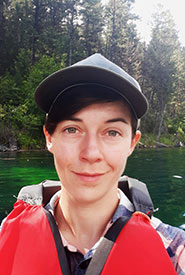
Ocean Kveder (Photo courtesy of Ocean Kveder)
As the Nature Conservancy of Canada’s (NCC’s) internal communications & culture intern, for the month of August I will be highlighting several of our interns working across Canada. Their contributions are helping conserve and...
Close encounters: Baffling beavers and tracking elk at Hastings Wildlife Junction
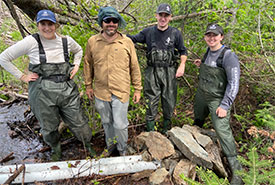
The Large Landscapes Team with beaver baffler (Photo by NCC)
A great day packed with sights and sounds for the large landscapes team at the Hastings Wildlife Junction! Back in May 2023, the Nature Conservancy of Canada’s (NCC’s) staff were made aware of flooding along a trail due to beaver...
Understanding gratitude as a survival skill
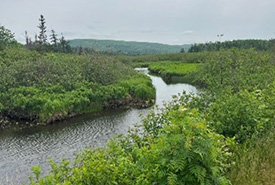
NCC’s Black River Bog property, NS. (Photo by Jill Ramsay/NCC staff)
A naturalist and former mentor of mine once told me that gratitude was a survival skill. My initial interpretation took this to be a re-imagining of the various “stay positive” expressions we have all heard over the years. But he...
When it comes to wetland restoration and maximizing soil carbon storage, location matters
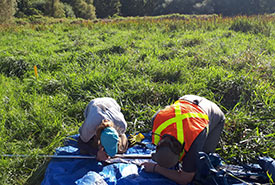
A day in the field at the Long Point Biosphere Reserve (Photo by Amanda Loder)
As appreciation from the public grows for the ecological and cultural values of wetlands, there is increasing demand to bring back those wetlands that have been converted or altered. Wetlands were once widespread across the temperate region of...
Batchewana Island: Protecting paradise
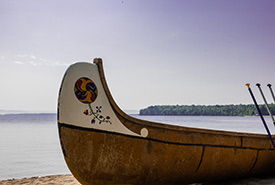
The canoe on the beach, with Batchewana Island in the background. (Photo by Andrea J Moreau/NCC staff)
As a communications intern at the Nature Conservancy of Canada (NCC), I’ve spent a lot of time looking at photos of the many beautiful properties managed by NCC, carefully selecting the right shot to be included in a blog post or newsletter....
The McIntyre Ranch — Preserving native grassland and wildlife habitat
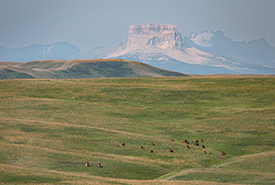
McIntyre Ranch, AB (Photo by Leta Pezderic/NCC staff)
There have been many special occasions in the 129-year history of McIntyre Ranch, but, surely, conserving it forever must be one of the most momentous ones. In 1894, William McIntyre began his legacy to conserve grassland in a sustainable manner,...
It’s a wall! It’s a fence! No, wait, it’s a conservation tool!
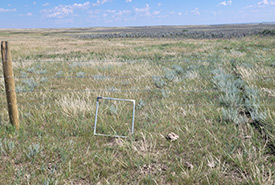
Wildlife friendly fence. You can see where the fence bisected a cattle trail, and will change how cattle move across that piece of land. (Photo by NCC)
There could be a joke that starts like this: a wildlife biologist and a rancher stand looking at a fence.... If you’re familiar with all the ways biologists and ranchers push and pull over what types of infrastructure developments are...
How AI can benefit conservation
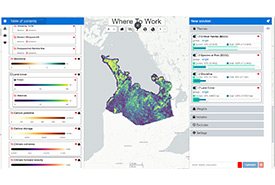
The Where to Work tool that allows users to set priorities on parameters such as (biodiversity, climate and ecosystem services) and receive a visualization of potential areas that is suitable for the goals we want to achieve.(Screenshot courtesy of NCC and Carleton University)
AI, or artificial intelligence, is in the news a lot lately. The stories range from very positive to doom and gloom. With all the talk about AI these days you might wonder, does AI play a role in the work that the Nature Conservancy of Canada...
Surviving the storm: What happens after the trees come down?
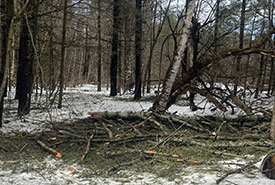
Downed trees in Gillies Grove after the freezing rain thunderstorm in spring 2023 (Photo by NCC)
Whenever we experience a big storm in eastern Ontario, my thoughts turn to the Gillies Grove Nature Reserve. Home to some of the last remaining old-growth forest in eastern Ontario, this Nature Conservancy of Canada (NCC) project is considered...
No easy task: Ayla Peacock on battling invasive species in the Crown of the Continent
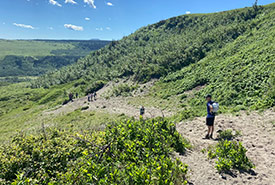
Getting to Conservation Volunteers site often involves a scenic hike through the land. Blind Canyon, AB (Photo by NCC)
I’m lucky enough to work in within the Crown of the Continent, a region straddling the continental divide in the Rocky Mountains that covers corners of Montana, Alberta and British Columbia. This unique landscape features magnificent and...

